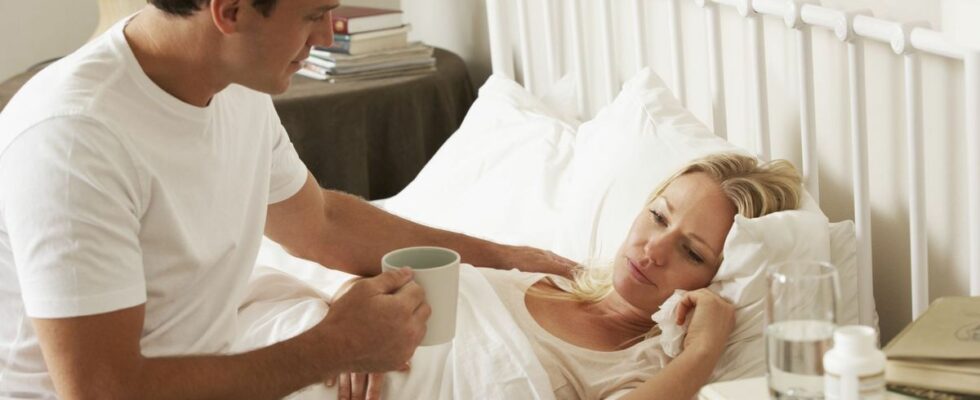Published on
updated on
Reading 3 min.
in collaboration with
Amélie Boukhobza (Clinical Psychologist)
Illness can affect anyone. And when it creeps into a couple, it creates a real gap between the healthy partner and the suffering one. Should you stay in a relationship in this situation or separate, putting your well-being first? We asked Amélie Boukhobza, clinical psychologist, the question.
Imagine: you are in a relationship and your partner falls ill. The situation lasts, you adapt before learning that it is a chronic illness and that nothing will ever be the same again. Should you stay (and transform yourself into a caregiver) or separate, at the risk of being seen as selfish? This is the question we asked our expert, psychologist Amélie Boukhobza.
A dilemma that everyone will resolve in their own way.
“Leaving a chronically ill spouse is a very complex and delicate subject.” the psychologist immediately exclaims.”Society often tends to judge quickly, to see it as an act of selfishness or cowardice. But when we scratch a little beneath the surface of appearances, we realize that the situation is much more nuanced.” she analyzes.
When we love someone, we often imagine that this love is unconditional, ready to overcome all trials, including illness. However, living with a sick person on a daily basis is facing a very different reality.It is not only about accompanying the other in their physical pain, it is also about living with their psychological suffering. The illness creeps in everywhere, it becomes omnipresent, it takes up space, it invades the relationship” eexplains the psychologist rightly.It is no longer just a love story, but a constant struggle, a daily challenge that can quickly turn the relationship into a real ordeal.”
Is it selfish to want to preserve one’s mental health in this situation?
Not necessarily, according to our expert.It is human to want to protect oneself, to want to avoid sinking oneself. The caregiver, the one who remains, is often the first to become exhausted. The stressfatigue, despair can eat away at him from the inside, destroy him little by little. It is not a simple question of cowardice, it is sometimes a question of survival.”
Staying in a relationship where you feel consumed by the other person’s pain is risking your own collapse, sometimes even faster than the sick person.
Is it the same thing to leave someone you’ve known for a short time or your partner of years?
Obviously not.”The length of the relationship also plays a role. When you’ve known someone for a few months, it may be easier to tell yourself that you can leave, that you haven’t yet invested your whole life in this relationship. But when you’ve been married for years, things get complicated.” recognizes Amélie Boukhobza.There are memories, promises, commitments. We tell ourselves that we cannot abandon the other now. However, is it more courageous to stay out of obligation, out of guilt, than to leave to preserve what is left of ourselves? And probably what is left of the beauty of the couple, because with the weight of the illness, we can end up feeling anger and resentment, resenting the other for seeing our own life ruined.”.
Whatever the decision, there is no room for judgment.
Ultimately, the choice to stay or leave is each individual’s, and it should not be judged lightly.”It is not a selfish act to think of one’s own mental health. On the contrary, it is sometimes a necessity. Sacrificing oneself at all costs for the other is not always the solution.” the expert further emphasizes.We must remember that in order to be able to help someone, we must first be in a position to do so. And if staying means sinking together into a destructive spiral, then perhaps it is better to leave, for ourselves, but also for the other. Because a relationship where one is completely consumed by the suffering of the other is no longer a relationship, it is a slow agony.”
The real question to ask, ultimately, is perhaps this: how far am I prepared to go without losing myself?It is a delicate balance between love and survival, between support and self-preservation. There is no right or wrong answer, only personal choices, deeply human, sometimes painful, but necessary to not sink” she concludes.

